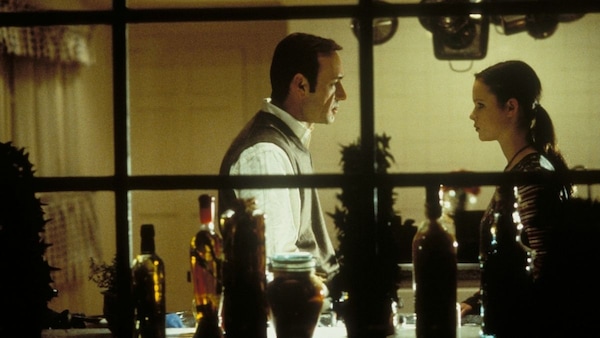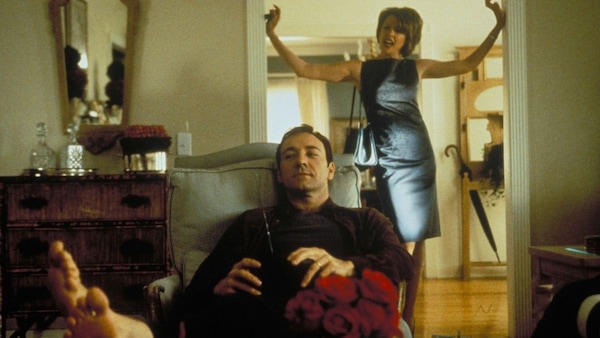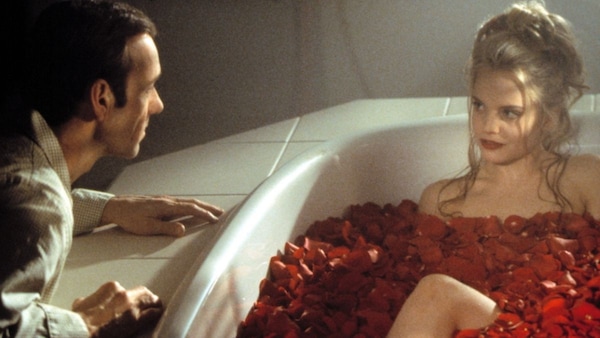American Beauty turns 22: Kevin Spacey’s ‘masterpiece’ in retrospect
Arguably Kevin Spacey’s most noted performance, Sam Mendes’ American Beauty loses more than just sheen when viewed under a modern prism.

Last Updated: 04.34 PM, Sep 08, 2021
Sam Mendes’ 1999 drama American Beauty follows Lester Burnham (Kevin Spacey) as he enters the proverbial ‘mid-life crisis’, casts away the duties of a snug life that he begins to loathe. But this drastic transformation takes place only after he begins having sexual fantasies about his teenage daughter’s best friend. Lester’s audacious move ultimately meets with a tragic end through his death, but only after he has redeemed himself.
The main narrative thread in American Beauty revolves around a precocious youngster who gets involved with a considerably older man (who ironically is also a father-figure, described as a “horny geek”). The cultural fit of such a seemingly perverse relationship drew its roots from classic Western romances which depicted a desirable woman being pursued by a much-older alpha male (with a significant social standing) who vies for her attention by competing with a young, virile man. It is not a surprise then, that the film houses references from Lancelot-Guinevere and Tristan-Isolde (Arthurian and Celtic myths respectively) that valorised similar relationships.
Thematically, American Beauty draws heavy references from Stanley Kubrick’s Lolita (1962) as well. Based on the 1955 novel by Vladimir Nabokov, the film put front and centre the “nymphet” figure of Sue Lyon, playing a 15-year-old in heart-shaped shades, sucking on a lollipop. Similarly, Mena Suvari in American Beauty brought forth the girlish American charm with sexual coyness in Lester’s dreams.
The “so-called” excitement of it all has often worked in the film’s favour when it is placed as an example of a coherent and clever depiction of the middle-class suburban discord.
As the film hit theatres, audiences and critics alike were taken aback by the complexity of relationships that Mendes charted through his film. With strong, embedded references to Freud’s notions on Electra complex, the film dared to speak about the unthinkable, in very problematic ways nonetheless (a fact evident on retrospection). On a revisit, the film can easily be a temporal tableau of the white, apparently sedate middle-class who are suddenly thrust into an identity crisis with the new century and political regime.

The film never wanted to play the role of just a drama. What may have been hailed as the unabashed celebration of frolic-driven White suburbia, now seems almost vulgar. To his credit, Spacey injected in Lester a significant amount of depravity and self-indulgence. Lester’s skewed sense of the saviour complex is almost laughable when viewed under the keen lens of 2021. Add to that, the now-exposed personal life of Spacey, and we’ve got a doubly inappropriate narrative.
Another deeply irking trope about American Beauty is Mendes' need to infuse his plot with marked-up stereotypes of certain societal groups. And thus, you have a token military man whose persona spouts homophobia and a virgin girl who tries to be promiscuous.
The other main element which needs to be kept in mind while revisiting a film like American Beauty is the cultural context in which it released. As America entered the throes of New Age spirituality, the concepts of beauty and reality were anyway undergoing transformation. In the present day, we have no such obligation to view it under the same prism, and that is when Mendes’ supposed avant-garde masterpiece falters. The concepts of relationships seem warped, and you continuously keep questioning the characters’ motives behind the actions they perform.
The dialogues, often hailed as exemplary for their use of wit and acerbic irony, now sound jaded and heavily laced with robust innuendos.

American Beauty was supposed to be a scathing commentary on American excesses. In fact, it may even have earned a merit on its basis. But now, its attempted satire just seems dated and uncouth.
It also does not help that the actor behind the notoriety of Lester shoulders a murky personal history himself. In fact, Suvari herself spoke in an interview, of a “weird and unusual” encounter with Spacey during the preparations of American Beauty’s filming.
American Beauty defied traditionality, but it just feels like a misplaced rebel in today’s context. The film does not really speak to today’s milieu where the boundaries of paedophilia are growing narrower by the day. It’s hard to call something art (though some may vehemently argue otherwise) when the redeeming qualities seem to diminish with the passage of time.

